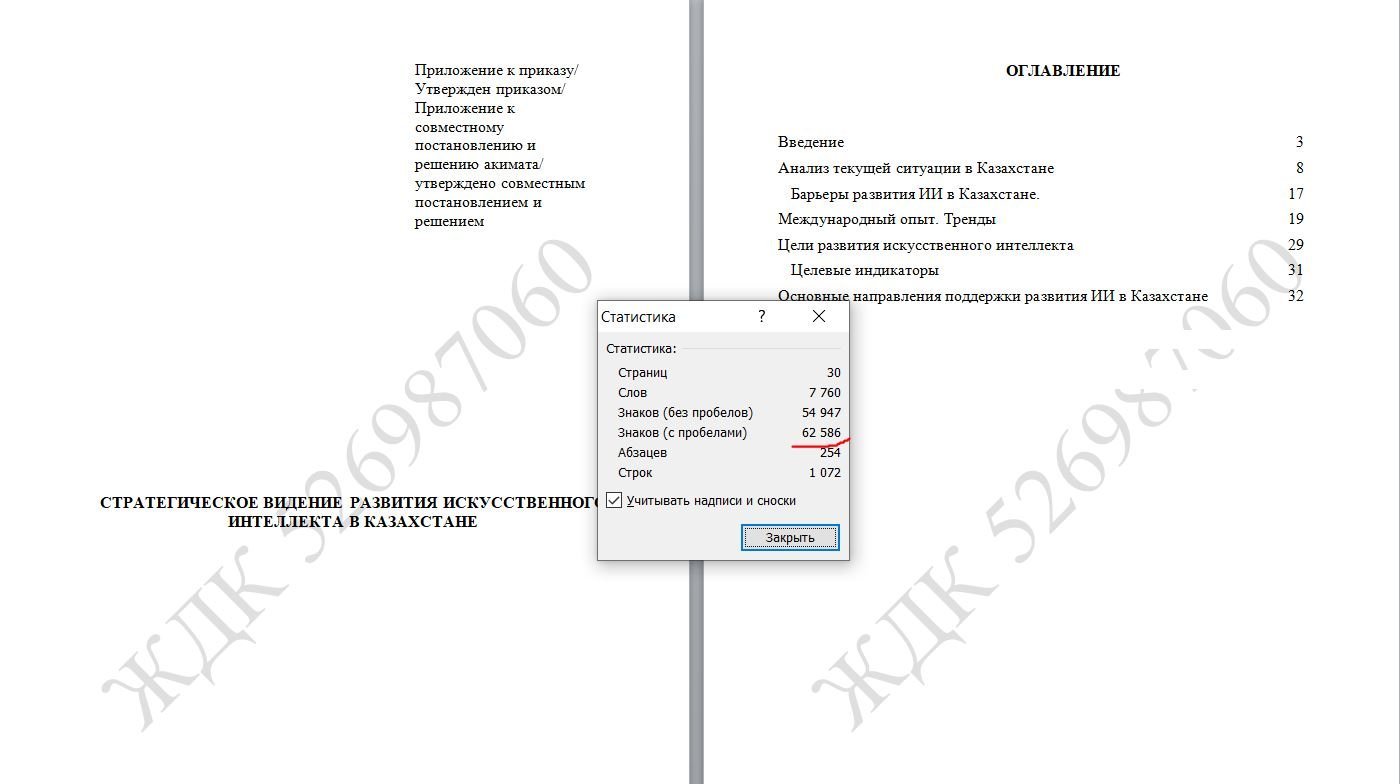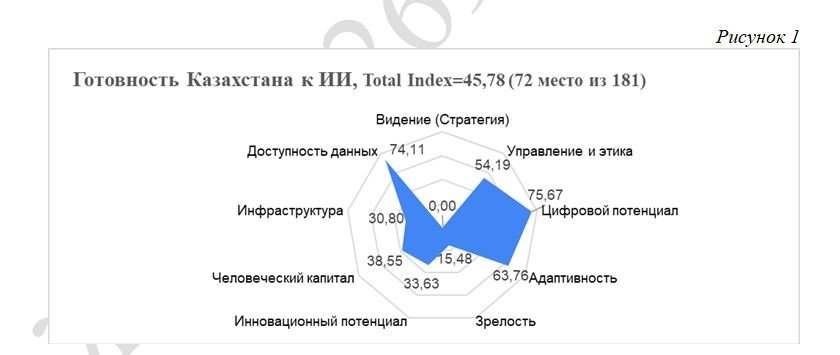How Plagiarism and Signs of Tribalism Were Found in AI Development Strategy
 photo cryptopolitan.com
photo cryptopolitan.com
An Orda Correspondent studied the document defining further AI development in Kazakhstan, developed by the Ministry of Digital Development.
On October 12, Astana hosted the annual international forum Digital Bridge – a unique platform for collaboration of IT companies, technology entrepreneurs, venture investors. Here they discussed the latest trends and prospects for the IT industry's development.
Show Me The Money
An Orda.kz correspondent studied the document "Strategic Vision of Artificial Intelligence development in Kazakhstan". It's worth starting with the drawbacks. The study's authors point out that in 2019, a Fund was created in Kazakhstan to support research and development in the field of AI, but it "does not operate at full capacity because of lack of funding."
From here arise the question: how can an allegedly inactive institution pay 287 million tenge in taxes to the state treasury without having state contracts? The institution is headed by Abzal Daribayev, the brother of a former high–ranking employee of national and quasi-state companies, in particular, a former member of the board of directors of Zerde Holding and ex-deputy akim of Almaty, Murat Daribayev.
The foundation's founding shareholder (founder) is the well–known Nazarbayev University.
Incidentally, Abzal Daribayev also directs the Center for Support of Microcredit Organizations LLP. It is engaged in research and development of projects in the field of natural and technical sciences. Since 2015, the company has contributed six million tenge to the treasury. Abzal Daribayev is also listed as the Director of Innovation Development of NURIS (Nazarbayev University Research Innovation System, "Innovation Cluster of Nazarbayev University").
Second Point of Interest
Kazakhstan plans to create an AI platform operator.
The window of applications for research and development in the field of AI will combine the so-called order funnels designed to select projects that will be given access to data and computing power to work out AI models, the authors of the document explain.
Who exactly will take the helm is still unknown. In 2021, it was believed that the previously mentioned "Fund for Support of Research and Development in the Field of Artificial Intelligence" would lead the project.
The selection in various fields will be handled by functioning accredited organizations that already provide support to entrepreneurs: Astana Hub, TechGarden, QazIndustry, QazInnovations.
We only hope that the story of embezzling budget funds will not happen again, as it was with Aliya Nazarbayeva's infamous company "Operator ROP" LLP, which charges a recycling fee from car importers.
There is another nuance worth discussing. Arman Abdrasilov, ex-chairman of the board of the Zerde holding and "virtual" opponent of Minister Bagdat Musin, checked this document through anti-plagiarism and criticized it. The check revealed that 43% of the content, according to him, has been copied and pasted from the Internet. We will discuss this more at the end of the article.

The aforementioned document says that the development of artificial intelligence is rests on four pillars:
- Qualitative data
- High personnel potential
- High internet speed
- Sufficient government regulation
At the very beginning, the ministry's analysts made an argument that is difficult to refute – AI is developing rapidly due to increased computing power, data accumulation and the development of 5G and Starlink networks.
Very soon a person will be able to interact directly with AI thanks to neurocomputer interfaces (exocortex).
AI's Development in Kazakhstan?
According to IDC (a global provider of information and consulting services), the costs of AI systems, equipment and specialized services will reach $154 billion by the end of 2023, which is 26.9% more than in 2022. At the same time, the generative AI market, according to Bloomberg Intelligence, has reached about $40 billion, and by 2025 it will grow to $217 billion, and in 2032 spending will exceed $1.3 trillion.
The changes will have a significant impact on human working conditions, consumer choice and PR, business models. It is predicted that by 2025, AI technology will support the processes and products of about 90% of advanced enterprise applications, education, medicine, retail and the arts, the document says.
The government's readiness index for artificial intelligence for 2022, conducted by experts from the Oxford Insights research company, speaks for itself: out of 181 countries, Kazakhstan ranked 72nd.
 Screenshot from the document
Screenshot from the documentOur strengths are data availability, digital potential and adaptability of the legal framework to digital business models. Weaknesses are the absence of large tech companies, unavailability of venture capital, insufficient R&D expenditures (a set of works aimed at obtaining new knowledge), the document says.
Analysts of the Ministry of Finance say that projects with AI technologies are already being implemented in medicine, education, transport, finance, industry and retail. And 24 universities and research centers are engaged in research and development in this area.
Communities of machine learning specialists are emerging. IT schools and universities also include the necessary information in their training programs. How we lay the foundation for the development of AI in Kazakhstan will determine the next five years,the authors note.
Based on the document, the Government has two overall tasks:
- Creating an AI ecosystem
- State regulation
But there are pitfalls. For example, how to explain to the population the need for artificial intelligence, as well as to educate personnel and keep them in the country.
The study's authors believe that Kazakhstan will succeed in medicine, agriculture, nuclear safety, public administration, and the creation of smart cities. And for this to happen, it is necessary to widely introduce 5G technology, create a special AI platform, work out schemes for combining computing power into one network, support startups in this area and solve the issue of secure access to personal data.
It turned out that Kazakhstan also plans to create a commission for the regulation of artificial intelligence. This is necessary to ensure the safety of a citizen when using AI products. The Commission will deal with:
- Evaluation of the AI product for safety
- Compliance with ethical standards
- Ensuring the transparency of algorithms
The commission's members have not been determined yet.
Meanwhile, in the index of Kazakhstan's readiness for AI, the country ranked 72 out of 181, according to Oxford Insights. They also touched base on problems, one of which is the lack of high-speed Internet in some medical institutions. But the country has an advantage – a high level of digitalization: in 2023, the republic ranked 28th in terms of e-government development among 193 countries.
Barriers
Poor Internet quality remains in many regions of Kazakhstan despite the 99% coverage. According to the Speedtest global index, Kazakhstan nonetheless ranks 73rd out of 140 countries and 95th in terms of broadband Internet access from the rating, which includes 181 states.
Reaction
Having studied the document, Arman Abdrasilov, the former chairman of the Board of JSC "National Infocommunication Holding "Zerde", criticized it. He said that "checking through anti–plagiarism showed that 43% of the article is copy paste from the Internet, 6% is fluff and 51% is nonsense."
The main source of inspiration for the regulator was this and this article. In total, 57 sites were plagiarized, making an abstract of a 7th grade student out of them," Abdrasilov wrote on his blog.
Orda.kz plans to talk to those who oppose the Ministry of Digital Development, Innovation and Aerospace Industry. The editorial board also intends to find out Abdrasilov's and Bagdat Musin's opinion regarding the digital future of Kazakhstan.
Original Author: Alexander Smolin
DISCLAIMER: This is a translated piece. The text has been modified, the content is the same. Please refer to the original piece in Russian for accuracy.
Latest news
- Scammers Posing as Security Agents Trick Architect Into Selling Property
- Ulytau Officials Respond to Fine: Blogger Was Penalized Over Unfounded Corruption Claims
- Kazakhstan Lifts Gallium Export Duty
- Chinese Firm Proposes to Fund New Port and Logistics Hub in Mangystau Region
- ForteBank Stock Soars on Home Credit Deal, Then Plunges 30% in a Day
- Coins Believed to Be Tied to Kairat Satybaldyulyuly to Be Auctioned
- Ukraine’s Military Intelligence Chief Says Ceasefire Should Come Before Year’s End
- Kyrgyz Citizen Fined in Kazakhstan for Carrying Banned Book Across Border
- Trial of Former Financial Police Officers in Khorgos Case No. 1 Closed to Public Over State Secrets
- Kazakhstan to Ban Outdoor Currency Rate Displays at Exchange Offices Starting September
- Armenian Court Orders One-Month Detention for Tashir Pizza Executive Amid Ongoing Investigation
- Kazakhstan May Require Banks to Offer Deferrals to Socially Vulnerable Borrowers
- Almaty Utility Pursues Debt Collection for Unpaid Heating and Hot Water Bills
- Kazakhstan and Afghanistan Sign Railway Memorandum
- Kazakhstan's National Bank Keeps Interest Rate at 16.5%, No Cuts Expected Until 2026
- Vyacheslav Kim Finalizes Purchase of Alatau City Bank
- Wild Arman Associate Detained in UAE Over Alleged Role in Qantar Riots
- Ulytau Region Akim Sues Woman for 495,000 Tenge Over TikTok Video
- Ukrainian Entrepreneurs Move to Buy BTA Bank from Kazakh Businessman Kenes Rakishev
- Kazakhstan’s Foreign Debt Hits 170.5 Billion USD in Q1 2025

